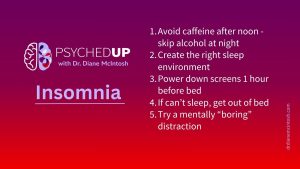
Struggling With Sleep? Here Are My Top Five Tips for Better Rest
I want to share my top five “sleep hygiene” habits that can support healthier sleep. They won’t solve chronic insomnia on their own, but they are essential ingredients for better rest.
Research has shown that severe stress and trauma experienced during childhood can impact your ability to cope as an adult and increase your risk of developing mental and physical illnesses.
Childhood trauma can leave a lasting impact because it can change how your genes work – this is called epigenetics.
To understand the term epigenetics, it’s necessary to have some background information about what genes are and how they work.

Your development occurred step-by-step, guided by your built-in instruction book, called deoxyribonucleic acid, or DNA, which is found in every cell in your body. Your DNA contains your genetic code, which provides the instructions necessary for you to grow, develop, reproduce and stay alive.
Coiled into 23 pairs of X-shaped chromosomes, one-half of your DNA came from your mother and the other half from your father. Siblings are so different from each other because they receive a different mix of DNA from their parents, unless they’re identical twins – they have exactly the same DNA.
I think of DNA as being like a piano keyboard. Every person has their own unique keyboard (except identical twins who have identical keyboards).
Each key on your keyboard represents a section of DNA called a gene. Genes hold the information needed for cellular differentiation: when specific genes are turned on (expressed) or turned off (suppressed) they direct development. Specific genes control traits like eye colour or height, while other genes direct cells to become heart, brain, or skin cells.
If our DNA is like a piano keyboard, the way the keys are played (the way genes are expressed) makes you who you are. Some keys are not played at all and others are always played. Some are played softly while others are played harshly. If, how, and when your genes are expressed ultimately makes you the unique individual you are. Think of it as “the music of you.” Interestingly, your tune can change, and what causes that change is epigenetics.
Your DNA is written in permanent marker – it never changes. Epigenetics – how your genes are expressed – is written in pencil. It changes throughout your life. Epigenetics is the interface between nature (the genes you inherit from your parents) and nurture (your life experiences).
How your genes are expressed, whether they are turned off or on, or played softly or harshly, depends on the unique genes you inherit from your parents, your developmental stage (e.g., fetus, puberty, menopause), and your environment.
Puberty, pregnancy and menopause are all complicated processes involving hormones and other brain chemicals, but these changes are laid out in our instruction booklet – our DNA – and the genes that make up our DNA.
During puberty, some genes are expressed and others are suppressed, causing males and females to develop different secondary sexual characteristics.
We now know that our inherited genetic code, as well as our environment (e.g. life events, what we eat, toxin exposures) can affect how our genes are expressed. For example, all girls have the genes necessary to provoke the onset of puberty and menstruate, but some begin at age 10, while others don’t start until much later. When and how their body changes during puberty is determined by not just the genes they inherited, but by other environmental factors as well.
Toxin-related epigenetic changes are an example of our environment impacting gene expression. Toxins found in cigarette smoke can cause many types of cancer by triggering the expression of cancer-causing genes or the suppression of genes that protect against cancer. Disturbingly, research has demonstrated that epigenetic changes related to toxins can be inherited by our children.
If a father smokes and the toxins in the smoke provoke an epigenetic alteration in his genes, it can be passed on to his child.
If that altered gene is activated in his child, it can provoke the development of lung cancer, even if the child is an otherwise healthy non-smoker who has never been exposed to any lung-cancer risk factors.
Just like cigarette toxins can cause cancer, there is growing evidence that serious stressors, especially early in life, can alter gene expression and provoke physical and mental illness later in life.
Most of the scientific research conducted to understand the power of early life adversity has been done with rats. Rat moms who are loving and nurturing will lick their pups a great deal, thus they are called “high lickers.”
Licking doesn’t just keep pups clean – it provokes critical development. The size, strength, intelligence, reproductive capabilities, and physical and mental health of the pups are strongly influenced by the amount of licking. On top of these developmental benefits, a rat mom’s nurturing provokes epigenetic changes in genes that can help pups manage stress.
Pups of high-licking moms usually become high-licking parents themselves – the licking trait is heritable. This highlights that epigenetic changes related to loving and nurturing parenting can be passed down to our children, helping them to be loving and nurturing parents themselves.
Unfortunately, the inverse is also true: growing up in an abusive, chaotic, or non-nurturing environment can provoke changes to a child’s genome that can be passed on to their offspring, heightening the risk of generational abuse, neglect, and family chaos.
There is some good news: rat pups from low-licking moms can be adopted by high-licking moms, and the pup’s stress response can improve. However, what we don’t know is how long a pup can be exposed to a stressful environment before the harmful epigenetic changes become irreversible.
Low-licking rat moms don’t suddenly become high-licking rat moms, perhaps because they don’t have access to high-quality psychotherapy. Fortunately, most human parents have a great ability to change, if that is their wish, especially if they have access to a supportive environment.
Research has also demonstrated that there are not just emotional implications, such as depression and anxiety, that result from severe childhood adversity. Children who are exposed to serious chronic stress or abuse are at risk for physical illnesses as well, including heart disease, obesity, diabetes, and other inflammatory illnesses.
Physical, sexual, and emotional abuse is tremendously harmful to developing brains and bodies. Neglect, chaos, and unpredictable, fragmented parenting can also result in enduring harm and impairment.
If something that was highly distressing, traumatic, and unfair happened to you as a child, that does not define you. Many people have crappy childhoods, enduring abuse, neglect, chaos, and loss, and become happy, fulfilled, generous, loving people. They also become great parents, partners, siblings, and members of the community.
No one chooses to be burdened with trauma as a child. One of the reasons traumatic experiences can have such a great impact on children is because they have so little control over what happens to them.
However, as adults, we do have control. In fact, the only person on earth we can control is ourselves. As adults, we must protect the children in our lives, and strive to create a society that is safe, loving, and nurturing for every child.
I look forward to hearing your thoughts on this blog post. Send me your thoughts on my Contact form or through LinkedIn.
Dr. Diane McIntosh is a psychiatrist, innovator, educator, author and speaker. She is a passionate advocate for better mental health care, and a champion for all who suffer from mental health challenges.
This blog post is part of a series looking at the state of our mental healthcare system and ways we can create sustainable change to improve quality and outcomes for anyone impacted by mental illness.

I want to share my top five “sleep hygiene” habits that can support healthier sleep. They won’t solve chronic insomnia on their own, but they are essential ingredients for better rest.

There’s something about flipping the page on the calendar from December to January. For many of us, the beginning of a new year represents a clean slate. So, if you find yourself in the mood to take that time to pause and reflect after the holidays, here are a few tips on making smart New Year’s resolutions.

The holidays can be stressful. Here are a few thoughts on how to make the most of what can be a most wonderful time of the year.
Dr. Diane McIntosh is a psychiatrist, innovator, educator, author, and speaker. She is passionate advocate for better mental health care, and a champion for all who suffer from mental health challenges.
Please provide your contact information in the form below. It helps if you provide enough detail in your message so we can help. We look forward to hearing from you!
Thank you for your message. We will respond to your email promptly.